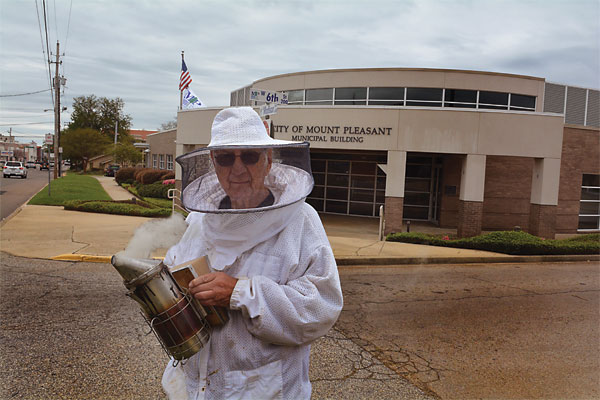Does a movement that might save humanity rest unknowing within ordinances composed at city hall?

By RON COUCH
Special to the Journal
Bees will pollinate anything. Fat blooms, skinny blooms, beautiful blooms, ugly blooms – it doesn’t matter. Spring is a one-time flash in the life of a bee that’s gonna be dead by the time it rolls around again.
It’s a matter of life and death.
It takes 2 million blooms to make a pound of honey, says goldenblossomhoney.com. Bees have no more than weeks to gather enough nectar to make honey to feed the next generation of the hive. Failure is not an option. If bees were people, there wouldn’t be a mower cranked until the spring bloom passes.
Hives trucked into East Texas each winter return millions in revenue when they’re shipped out to California almond groves. Industrial developers hip to bees would lobby for dandelions, protect prickly ash, clamor to repeal those parts of city codes related to lawn upkeep.
Hairy-legged feminists would idolize the perfected matriarchal rule of the queen served by a royal court. Here’s where humans come in as passive characters in the script, oblivious to understanding our part in our own global life and death drama.
Without bees, we starve. I wouldn’t say it if the Big Brains didn’t have my back.
Declining bee populations pose a threat to global agriculture, researchers at Yale proclaim.
What happens, the girls gathering nectar brush the anther gathering male pollen on their hairy legs. Buzzing to the next bloom, they sprinkle pollen like fairy dust over the female stigma of the next flower they touch. As smart as we are, there’s no technology that can replicate the efficiency of bees sustaining every plant that cross pollinates.
A third of the world’s food crops depend on pollination accomplished by insects, birds, bats, lizards – everything down to the wind playing into the explosion of spring.
If I have a point, which I do, it comes with a preface: there is magic in the life of a bee, a natural order of the universe that’s beyond understanding. Example: Given the mass of a bee relative to surface area of the wings, all that we know suggests bees shouldn’t be able to fly.
The case for super natural order rests, your honor.
Like the worker bee whose life will give but a teaspoon of honey, you alone, gentle reader, lack the power to save the universe as we understand it this side of The River Jordan. Yet imagine a world where each of us mows around the dandelions, a town respecting all that flowers, a community in which a wife understands that it is her husband’s love of humanity sentencing him to the couch to watch The Masters rather than working on the yard.
It’s critical. It’s humane – make that bee-mane. An unkempt lawn is a sign of reverence for the fleeting golden days of an old bee that’s sorn the hair off her legs gathering nectar, wholly indifferent to coincidental pollination.
An unkempt lawn is a matter of respect for the male bee surviving against all odds to serve but once a queen weeks in preparation for her mating flight. For the good of the hive he gives his life, his segmented abdomen ripped asunder by his singular contribution.
It’s the destiny of the scant sliver of a hive’s surviving males. From cradle to grave, lady bees do all the work starting with housekeeping and nursery duty spinning up to their launch as foragers. Unneccessary male larvae are eaten.
They taste just like chicken.
So that you know when it comes up in conversation, it’s not the nectar the beekeepers with the California hives bring their bees for in winter – it’s the pollen. Females programmed to feed the adults through the winter secrete stuff making a nutritious paste from pollen. After they ship out, it’s our hometown bees that make local honey from local blooms.
Circumvent convention. Start a movement. Save time and energy. Defy authority.
Cut back on the yard work. Savor the blossoms sustaining our bees.





